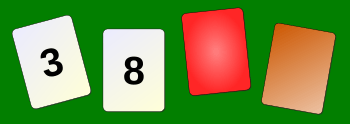Wason selection task facts for kids
The Wason selection task (or four-card problem) is a logic puzzle devised by Peter Cathcart Wason in 1966. It is one of the most famous tasks in the study of deductive reasoning. An example of the puzzle is:
You are shown a set of four cards placed on a table, each of which has a number on one side and a colored patch on the other side. The visible faces of the cards show 3, 8, red and brown. Which card(s) must you turn over in order to test the truth of the proposition that if a card shows an even number on one face, then its opposite face is red?
A response that identifies a card that need not be inverted, or that fails to identify a card that needs to be inverted, is incorrect. The original task dealt with numbers (even, odd) and letters (vowels, consonants).
The test is of special interest because people have a hard time solving it in most scenarios but can usually solve it correctly in certain contexts. In particular, researchers have found that the puzzle is readily solved when the imagined context is policing a social rule.
Solution
The correct response is to turn over the 8 card and the brown card.
The rule was "If the card shows an even number on one face, then its opposite face is red." Only a card with both an even number on one face and something other than red on the other face can invalidate this rule:
- If the 3 card is red (or brown), that doesn't violate the rule. The rule makes no claims about odd numbers.
- If the 8 card is not red, it violates the rule.
- If the red card is odd (or even), that doesn't violate the rule. The red color is not exclusive to even numbers.
- If the brown card is even, it violates the rule.
Use of logic
The interpretation of "if" here is that of the material conditional in classical logic, so this problem can be solved by choosing the cards using modus ponens (all even cards must be checked to ensure they are red) and modus tollens (all non-red cards must be checked to ensure they are non-even).
Alternatively, one might solve the problem by using another reference to zeroth-order logic. In classical propositional logic, the material conditional is false if and only if its antecedent is true and its consequent is false. As an implication of this, two cases need to be inspected in the selection task to check whether we are dealing with a false conditional:
- The case in which the antecedent is true (the even card), to examine whether the consequent is false (the opposite face is not red).
- The case in which the consequent is false (the brown card), to study whether the antecedent is true (the opposite face is even).
Explanations of performance on the task
In Wason's study, not even 10% of subjects found the correct solution. This result was replicated in 1993.
Some authors have argued that participants do not read "if... then..." as the material conditional, since the natural language conditional is not the material conditional. (See also the paradoxes of the material conditional for more information.) However one interesting feature of the task is how participants react when the classical logic solution is explained:
A psychologist, not very well disposed toward logic, once confessed to me that despite all problems in short-term inferences like the Wason Card Task, there was also the undeniable fact that he had never met an experimental subject who did not understand the logical solution when it was explained to him, and then agreed that it was correct.
This latter comment is also controversial, since it does not explain whether the subjects regarded their previous solution incorrect, or whether they regarded the problem sufficiently vague to have two interpretations.
See also
 In Spanish: Tarea de selección de Wason para niños
In Spanish: Tarea de selección de Wason para niños


